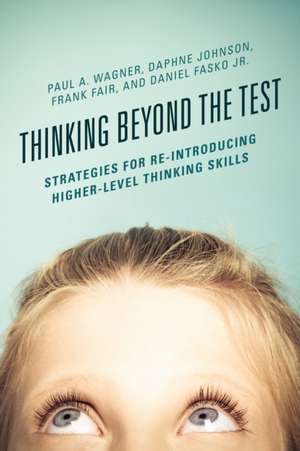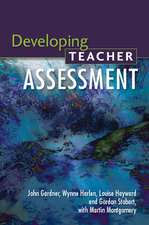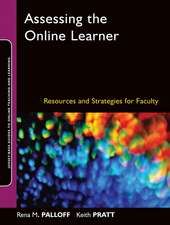Thinking Beyond the Test: Strategies for Re-Introducing Higher-Level Thinking Skills
Autor Paul A. Wagner, Frank Fair, Daniel Faskoen Limba Engleză Paperback – 9 dec 2016
| Toate formatele și edițiile | Preț | Express |
|---|---|---|
| Paperback (1) | 231.93 lei 6-8 săpt. | |
| Rowman & Littlefield – 9 dec 2016 | 231.93 lei 6-8 săpt. | |
| Hardback (1) | 434.85 lei 6-8 săpt. | |
| Rowman & Littlefield – 16 dec 2016 | 434.85 lei 6-8 săpt. |
Preț: 231.93 lei
Nou
Puncte Express: 348
Preț estimativ în valută:
44.38€ • 46.34$ • 36.73£
44.38€ • 46.34$ • 36.73£
Carte tipărită la comandă
Livrare economică 04-18 aprilie
Preluare comenzi: 021 569.72.76
Specificații
ISBN-13: 9781475823219
ISBN-10: 1475823215
Pagini: 104
Dimensiuni: 152 x 229 x 9 mm
Greutate: 0.25 kg
Editura: Rowman & Littlefield
ISBN-10: 1475823215
Pagini: 104
Dimensiuni: 152 x 229 x 9 mm
Greutate: 0.25 kg
Editura: Rowman & Littlefield
Notă biografică
Paul A. Wagner, B.S. Political Science and economics (double major), M.A. (philosophy), M. Ed. (Higher Education Administration), Ph.D. (Philosophy).Dr. Wagner has always been very active in civic and charitable affairs. Beginning in Columbia, Missouri, he served as Vice Chair of the City's Human Rights Commission. In Houston, Texas, he has served on numerous Board of Directors including the Houston Marathon, Leadership Houston, The Houston Volunteer Center, The Bay Area Symphony Society, Bay Oaks School, and numerous committees in organizations such as the American Cancer Society, the Society for Prevention of Cruelty to Animals, Second Baptist's Pastor Prayer Team, the Linda Lorelle Scholarship Foundation, and the Sparacino Dance Company. He has done consulting in strategic planning and management practice with a number of corporations, hospitals, and universities, such as The Houston Chronicle, M.D. Anderson Hospital Volunteer Division, and the University of San Francisco. He has also held a number of senior-level positions in scholarly organizations. He was named an Outstanding Young Man while in Columbia, Missouri, and has been awarded inclusion in the following since then: Who's Who in America, Who's Who in the World, Who's Who in Education, Who's Who among America's Teachers, to name but a few. He has taught at universities from coast to coast and from the northern Midwest to the South. He has taught from undergraduate to doctoral students. At the university level, he has taught in the following areas: philosophy, psychology, political science, education, cognitive science, economics, "Development of the Sciences," management theory (MBA program), organizational behavior, and applied ethics in a course for doctoral students in two different doctoral-granting institutions. One course was titled "Ethics, Values and Responsibilities" and the other, "Ethics of Administrative Leadership."For thirteen years he emceed and was an expert commentator several times each year for public television. In addition to living in Houston for forty years, he also had a small ranch out near Brenham, Texas. He has run over 50,000 miles in his life according to running journals he has kept since he was 28. He has over 160 publications listed on Google Scholar including nine previous books. He is a member of a number of professional organizations including the American Philosophical Association, the Evangelical Philosophical Society, the American Psychological Association, the American Association of Public Administrators, and the Association of Practical and Professional Ethics. Finally, he was a founding member of the Texas State Ethics Commission and the LBJ School of Public Affairs, University of Texas annual Ethics workshop for senior State Officials in the 1990s. To top everything off, he was an altar boy from 11 - 13 years old at St. Barbara's Church in the suburbs of Chicago.
Cuprins
Acknowledgments
Introduction
Part I Background for the Scripts
Chapter 1 Critical Thinking and the Schools
Chapter 2 Philosophical Inquiry and the Great Conversation
Chapter 3 Psychological Research and Theories on Thinking
Chapter 4 Establishing a Community of Inquiry in the Classroom
Part II Scripts and Scripting
Tips for Using the Scripts Successfully
Chapter 5 Scripts for Elementary School Students
Chapter 6 Building Your Own Scripts
Resources for Further Information
References
Descriere
This book provides resources for teachers in grades 3 - 6 to take advantage of teachable moments by drawing students into productive intellectual discussions. It also provides an overview of the rationale and research base for engaging students in educational activities that are truly intellectual and not limited to training for testing success.






